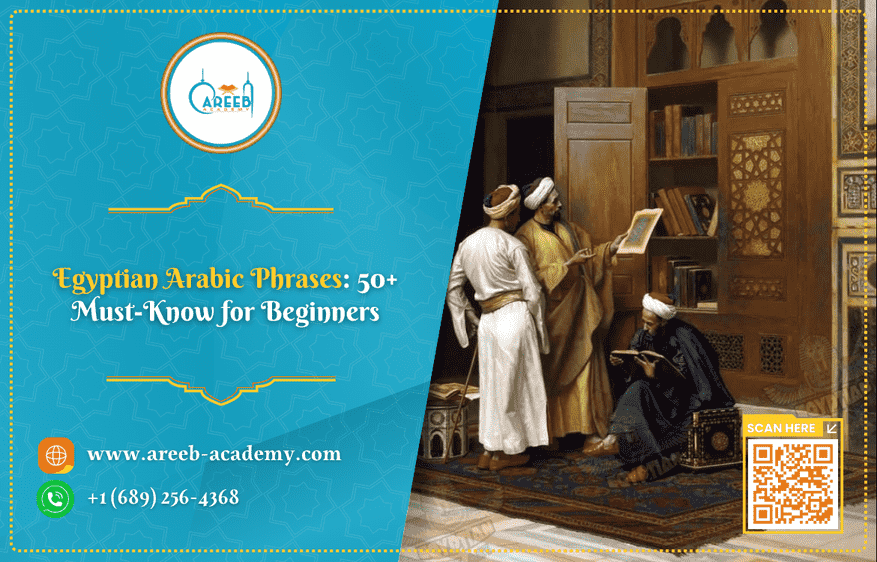
Egyptian Arabic Phrases are a great starting point for anyone learning Arabic who wants to speak naturally and connect with locals. First of all, learning Arabic is an exciting journey, and therefore, choosing where to begin can make all the difference. In fact, many learners quickly discover that Arabic isn’t just one form—on one hand, there’s the classical, formal version known as Fusha, and on the other hand, there are spoken dialects like Egyptian Arabic, the most widely understood across the Arab world. Consequently, each one serves a different purpose and additionally opens its own door into the language and culture.
Whether you’re planning a trip to Egypt, studying Arabic for personal or academic reasons, or simply curious about the dialect you hear in movies and music, understanding the difference between Fusha and the Egyptian dialect can help you learn smarter, not harder. Moreover, once you get comfortable with the basics, using everyday Egyptian Arabic phrases gives you a real taste of how Egyptians speak, joke, greet, and connect.
In this guide, we will walk you through these differences. Additionally, we will highlight the most useful Egyptian phrases and provide practical tips to learn the dialect quickly and confidently. By the end, you’ll have a clear roadmap for combining Fusha and Egyptian Arabic in your learning journey.
The Differences Between Classical Arabic (Fusha) and the Egyptian Dialect
Before you dive into learning Arabic, it really helps to understand how Classical Arabic (Fusha) differs from the everyday Egyptian dialect (Masri). Although both forms sit under the same language umbrella, each one grew in its own direction, shaped by history, culture, and the needs of the people who use it. Therefore, here’s a closer look at the main differences and why both are valuable in their own way.
Historical Roots
First, Classical Arabic (Fusha) traces its origins back to early Arabia. It’s the language of the Quran, classical poetry, and the foundational texts that shaped Arab identity. Over time, it became the standardized language used in education, media, books, academic writing, and official communication across the Arab world. For example, when you open a newspaper or listen to a formal speech, you’re usually hearing Modern Standard Arabic — a contemporary form built directly on Fusha.
Read more about our Fusha Arabic classes.
In contrast, the Egyptian dialect grew from the spoken Arabic brought to Egypt after the Islamic conquest. Moreover, it absorbed layers of influence from the Pharaonic era, Coptic language, and later interactions with the Ottoman Empire, French, Italian, and English. Consequently, this blend gave Egyptian Arabic its light, catchy rhythm and made it a naturally evolving spoken language. By learning and practicing Egyptian Arabic Phrases, you can access the humor, emotion, and everyday expressions Egyptians use in daily life.
Pronunciation and Sound
One of the clearest differences shows up in how each form sounds.
Fusha has a precise, almost musical structure. Vowels are clear and carefully pronounced, and consonants follow strict articulation rules. It sounds formal because it’s meant to be understood across all Arab countries.
Egyptian Arabic relaxes many of these rules. Certain classical sounds shift completely:
- The letter ج becomes g as in “go” instead of “j”.
- Some ق (qāf) sounds turn into a glottal stop (a quick break in the throat sound), especially in Cairo.
- Vowels get softer, shorter, and more fluid.
These small shifts create that instantly recognizable “Masri” feel — warm, smooth, and expressive.
Vocabulary and Expressions
Classical Arabic uses a rich, formal vocabulary rooted in centuries of literature. For instance, words tend to be elegant, structured, and connected to older linguistic forms. Therefore, this is the Arabic you’ll find in books, news articles, and academic writing.
In contrast, Egyptian Arabic is much more flexible. It not only borrows from foreign languages, but also invents slang on the go, while reflecting the fast-paced rhythm of Egyptian streets. Moreover, you’ll hear expressions that don’t exist in Fusha — playful, humorous, and full of personality. By learning and using Egyptian Arabic Phrases, you can navigate everyday conversations, from movies and songs to casual interactions that make the culture come alive.
Formal vs. Everyday Use
When you’re giving a presentation, writing an email to a company, reading a newspaper, or studying at a university — Fusha is your go-to. It’s the shared formal language of the entire Arab world.
However, once you step into a café, jump in a taxi, chat with neighbors, or try to negotiate in a market, Egyptian Arabic Phrases are what people actually use. Thus, this dialect becomes your key to connecting with locals, understanding Egyptian humor, and feeling the cultural heartbeat of the country.
Why Learners Benefit From Both
Fusha gives you access to a unified, structured version of Arabic — perfect for reading, writing, and professional communication.
Egyptian Arabic gives you access to real conversations, daily life, and the warm, friendly communication style Egypt is known for.
Most learners find that knowing both forms opens different doors:
- Fusha helps you understand media, books, and formal speech.
- Egyptian Arabic helps you communicate naturally, make friends, and navigate real-life situations.
Together, they form a complete picture of the Arabic language — one formal and historical, the other lively and modern.
Why Learn Egyptian Arabic Phrases
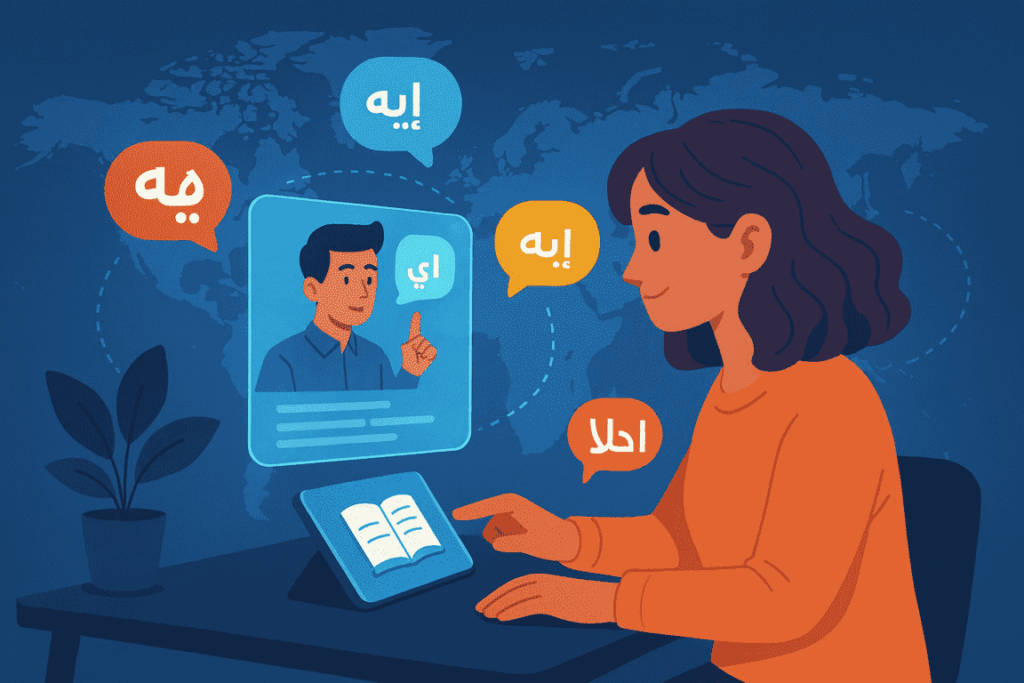
Learning a new language opens doors to understanding culture, making connections, and enjoying authentic experiences. In particular, Egyptian Arabic Phrases are especially useful because they not only help you communicate with millions of people in Egypt, but also are widely recognized across the Arab world. Therefore, whether you’re traveling, studying, or simply curious about the language, mastering these phrases brings you closer to the heart of Egyptian life and culture.
Read our previous post: Learn Egyptian Arabic: Speak Naturally, Connect Deeply to get a deeper introduction to Egyptian Arabic and how to start speaking naturally.
Speak the Language of Millions
For example, Egyptian Arabic Phrases allow you to communicate with over 100 million Egyptians. Moreover, beyond Egypt, many people across the Arab world can understand these phrases, which makes them a practical choice for travelers, students, and online learners who want to connect with Arabs from different countries.
Access Egyptian Culture Directly
Additionally, learning Egyptian Arabic Phrases gives you a front-row seat to Egypt’s rich cultural scene. From classic movies to modern music and television shows, understanding these phrases lets you enjoy content exactly as locals do—without having to wait for translations.
Make Daily Life Easier in Egypt
Furthermore, whether you’re ordering food, asking for directions, or shopping in local markets, Egyptian Arabic Phrases make everyday interactions smoother. As a result, you’ll feel more confident navigating Cairo’s streets, Alexandria’s cafes, or any part of Egypt with ease.
Build Friendships and Connections
Using Egyptian Arabic Phrases shows respect and interest in the local culture, helping you form genuine friendships. Egyptians appreciate when visitors make an effort to speak their dialect, and this can open doors to memorable experiences and deeper personal connections.
A Simple Gateway to Other Dialects
Starting with Egyptian Arabic Phrases can make learning other Arabic dialects easier. Many words and expressions are similar across the region, so this dialect acts as a bridge to understanding Arabic in Morocco, the Gulf, or Levant countries.
Basic Egyptian Arabic Phrases
Common Phrases for Greetings

Ahlan w sahlan – أهلا وسهلا
- A common way to greet someone in Egypt. You can just say “Ahlan” for a casual hello.
- Response: Ahlan bīk / biki – أهلا بيك / بيكي
As-salāmu 3aleikum – السلام عليكم
- Lit. “Peace be upon you.” Very common greeting among Muslims.
- Response: W aleikum as-salām – وعليكم السلام
- Optional: add wa raHmatu llāh wabarakātuhu – ورحمة الله وبركاته
SabāH el-kheir – صباح الخير
- Good morning greeting.
- Response: SabāH en-nūr – صباح النور
- Colloquial variants: SabāH il-ful / SabāH il-ward / SabāH il-‘išTa – صباح الفل / الورد / القشطة
Masā’ el-kheir – مساء الخير
- Good evening greeting.
- Response: Masā’ en-nūr – مساء النور
- Can also use: masā’ il-ful / masā’ il-ward / masā’ il-’išTa
Izayyak / Izayyek? – ازيك / ازيكِ
- How are you? Male / Female.
- Response: Kwayyis / Kwayyesa – كويس / كويسة (Good, thank God)
- Other options: izzayy il-aHwaal? – ازي الأحوال؟ (How are things?)
Everyday Egyptian Arabic Phrases
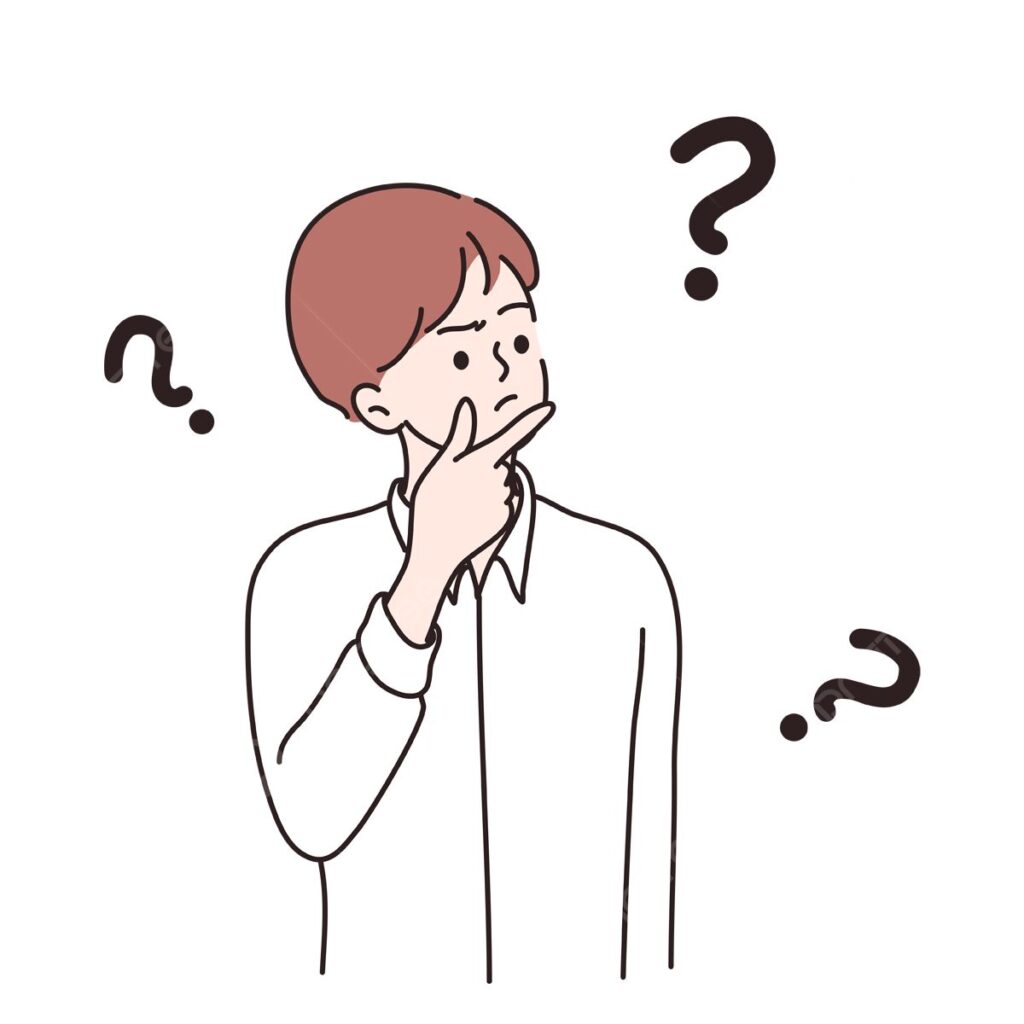
Useful for Daily Conversations
Shokran – شكرا (Thank you)
- Response: Afwan / العفو – You’re welcome
La shokran – لا شكرا (No, thank you)
Momken…? – ممكن؟ (Can I…? / May I…?)
Ana mish fahim / fahma – أنا مش فاهم / فاهمة (I don’t understand, male/female)
Min faDlak / law samaHt – من فضلك / لو سمحت (Please)
- Use to ask politely or get someone’s attention.
ItfaDDal – اتفضل
- Invitation to sit, enter, take something, etc.
Egyptian Arabic Phrases for Shopping

Bikam da? – بكام ده؟ (How much is this?)
Ghali awi! – غالي أوي! (That’s too expensive!)
Momken tkhafed shwaya? – ممكن تخفض شوية؟ (Can you lower the price?)
Fein el-su’ / el-mall? – فين السوق / المول؟ (Where is the market/mall?)
Egyptian Arabic Phrases for Traveling
Fein el-matār? – فين المطار؟ (Where is the airport?)
Ayez arooh el-hotel – عايز أروح الفندق (I want to go to the hotel)
Kamm el-taree’? – كام الطريق؟ (How much is the fare?)
Waqef hina, law samaHt – واقف هنا، لو سمحت (Stop here, please)
Common Egyptian Slang You’ll Hear Often
Fun & Popular Expressions
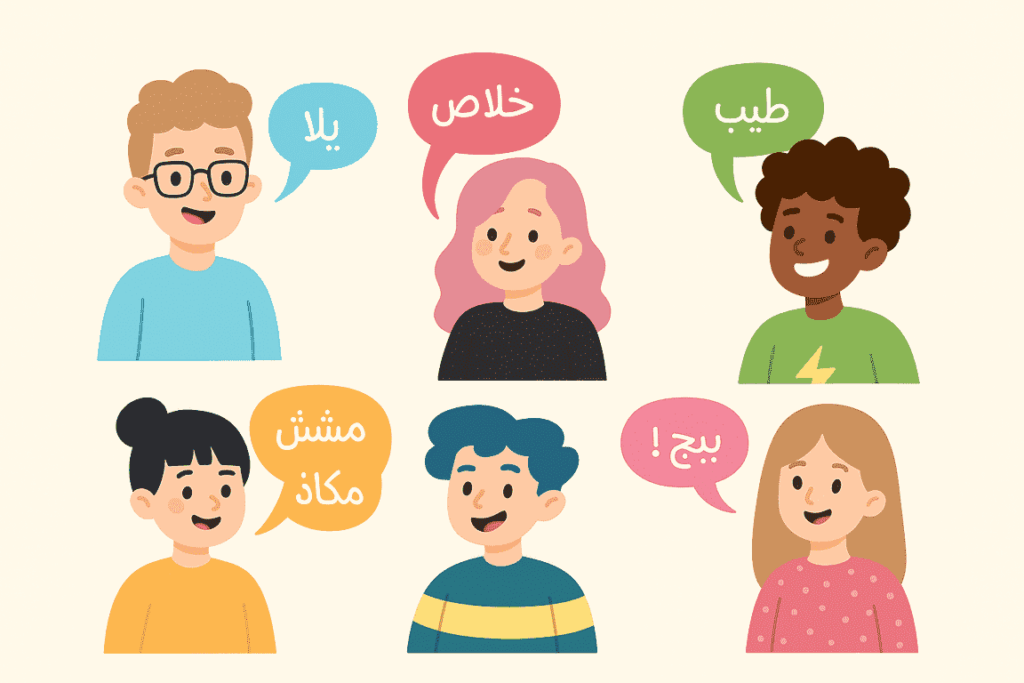
Yalla! – يلا! (Let’s go!)
Khalas! – خلاص! (Enough / Done)
Tayyeb – طيب (Okay)
Mesh mushkila – مش مشكلة (No problem)
Wallahi! – والله! (I swear!)
Egyptian Arabic Love & Friendship Phrases
Habibi / Habibti – حبيبي / حبيبتي (My dear, male/female)
Waheshni / Waheshani – وحشني / وحشتني (I miss you, male/female)
Enta gamil / Enti gamila – انت جميل / انتِ جميلة (You are beautiful)
Ashoufak bokra – أشوفك بكرا (See you tomorrow)
Explore more Egyptian Arabic words to expand your vocabulary.
Top Tips For Learning Egyptian Arabic Phrases
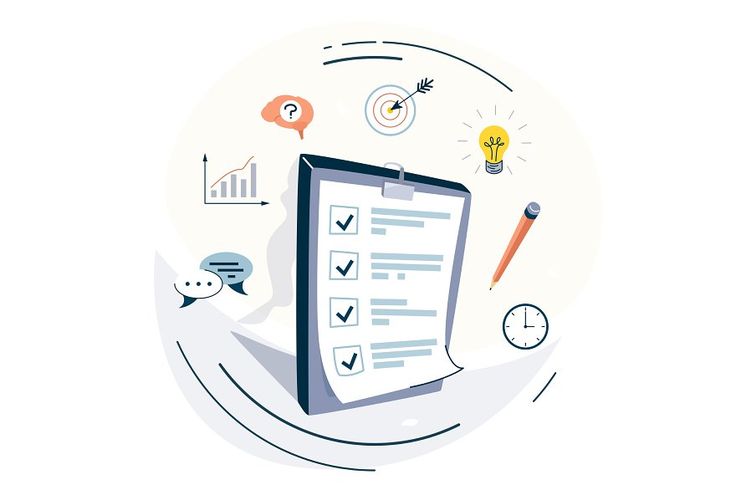
Learning Egyptian Arabic Phrases can be fun and useful, but it’s also important to know how to start the right way. Here are some fresh, practical tips that really work, whether you live in Egypt or not.
1. Make Egyptian Arabic Phrases Part of Your Day
Even small things count! For instance, talk to shopkeepers, order your coffee using Egyptian Arabic Phrases, or greet your neighbors. Additionally, repeating short phrases like “Sabah el-kheir” or “Shokran” every day helps a lot. As a result, the more you use these phrases, the faster your brain adapts.
2. Talk to People Using Egyptian Arabic Phrases
Don’t be shy! Egyptians love when foreigners try to speak their dialect. To begin with, start simple: “Izayyak? / Izayyek?” (How are you?) and respond with “Ana kwayes (for Males) / Ana kwayesa (for Females)” (I’m fine). Moreover, mistakes are normal, and people usually help you fix them. By practicing Egyptian Arabic Phrases in real conversations, you accelerate your learning significantly.
3. Use Egyptian Media
Movies, songs, and YouTube videos are not just fun—they’re your secret weapon. For example, listen carefully to pronunciation, rhythm, and expressions like “Yalla!” or “Mesh mushkila.” Then, repeat them aloud, and soon you’ll naturally absorb Egyptian Arabic Phrases.
4. Start with Everyday Egyptian Arabic Phrases
Focus on phrases you actually need:
- Ordering food: “Momken el-menu law samaHt?”
- Asking directions: “Fein el-matār?”
- Shopping: “Bikam da?”
Using these Egyptian Arabic Phrases in real situations builds confidence faster than just memorizing vocabulary.
5. Practice Makes Perfect
For example, set small challenges: talk to one new person each day, write a short diary in Franco-Arabic, or sing along to a song. Over time, these little steps every day add up, and as a result, help you master Egyptian Arabic Phrases more effectively.
6. Be Curious & Have Fun Learning Egyptian Arabic Phrases
Ask questions, notice funny expressions, and enjoy learning. Words like “Khalas!” or “Habibi” are part of Egyptian culture. Learning Egyptian Arabic Phrases also teaches you how Egyptians think, joke, and express themselves naturally.
Final Thought
Mastering Arabic doesn’t happen overnight, but by combining Classical Arabic with Egyptian Arabic Phrases, you get the best of both worlds. Specifically, Fusha builds your foundation for reading, writing, and formal communication, while Egyptian Arabic Phrases bring the language to life in cafés, markets, family gatherings, and everyday conversations.
To begin with, start small and practice these phrases often. Furthermore, listen carefully to how Egyptians speak, and let the language become part of your daily routine. As a result, you’ll find yourself understanding more, speaking more confidently, and connecting with people on a deeper level.
Arabic is a rich, vibrant language—and in addition, Egyptian Arabic Phrases, with their warmth, humor, and everyday charm, are one of the best ways to step into that world. Ultimately, using these phrases will make your learning experience both practical and enjoyable.
Ready to Start Your Egyptian Arabic Journey?
At Areeb Academy, you can learn Fusha, Egyptian Arabic, Quran, and Islamic Studies through one-to-one sessions designed around your goals.
Our teachers are experienced, native Egyptian speaker, patient, and know exactly how to guide beginners and advanced learners alike — and the best part? You can start with a free trial class.
With flexible schedules and personalized learning, you’ll find it easy to fit Arabic into your day no matter where you live.
Join Areeb Academy today and let your Arabic learning journey begin with confidence.
FAQs
1. What’s the difference between Classical Arabic (Fusha) and the Egyptian dialect?
Fusha is the formal version of Arabic used in books, news, education, and official communication.
Egyptian Arabic is the everyday spoken dialect used by Egyptians in conversations, media, movies, and daily life. Learning Egyptian Arabic Phrases helps you navigate these casual interactions.
Most learners study both: Fusha for reading and writing, and Masri for real conversations.
2. Is Egyptian Arabic hard to learn?
It’s easier than most people expect. The grammar is simpler than Fusha, pronunciation is catchy, and Egyptians are very encouraging when someone tries to speak their dialect. With daily practice and exposure to media, learning Egyptian Arabic Phrases becomes fun and natural, and learners usually progress fast.
3. How do I say “How are you?” in Egyptian Arabic?
You can say:
- Izayyak? (to a man)
- Izayyek? (to a woman)
Typical answers: - Ana kwayyes / kwayyesa (I’m good)
Using these Egyptian Arabic Phrases daily helps you build confidence in conversation.
4. How do I say “Thank you” in Egyptian Arabic?
You can say:
- Shokran – شكراً
And the reply is: - El-‘afw / Afwan – العفو
These Egyptian Arabic Phrases are essential for polite interactions.
5. How do I say “Where is…?” in Egyptian Arabic?
Very simple — you say:
- Fein…? – فين…؟
Examples: - Fein el-matār? (Where is the airport?)
- Fein el-hammām? (Where is the bathroom?)
- Fein el-mall? (Where is the mall?)
Mastering these Egyptian Arabic Phrases makes traveling and navigating Egypt much easier.
6. Do you offer online classes for beginners?
Yes. Areeb Academy provides personalized one-to-one lessons suitable for complete beginners, kids, teens, and adults — all with flexible timings and a free trial class. Lessons focus on both Fusha and practical Egyptian Arabic Phrases.


